Hugs and heartaches: Ageing parents stay strong despite challenges raising children with autism

Mr Goh consoling his autistic son Duane. Though Duane is 40, Mr Goh said it's like always having a little child at home. (Photo: Gaya Chandramohan).
SINGAPORE: “Mummy, daddy not old!” Duane Goh repeated this to himself over and over again as he bawled.
This was two years ago, when his maternal grandmother died. He got worried his own parents would pass on soon after as well.
His parents, Ang Hwee Chin and Goh Kim Joo, are both 74. When they tried to explain to their autistic son their time would come too, he refused to listen, said Mdm Ang.
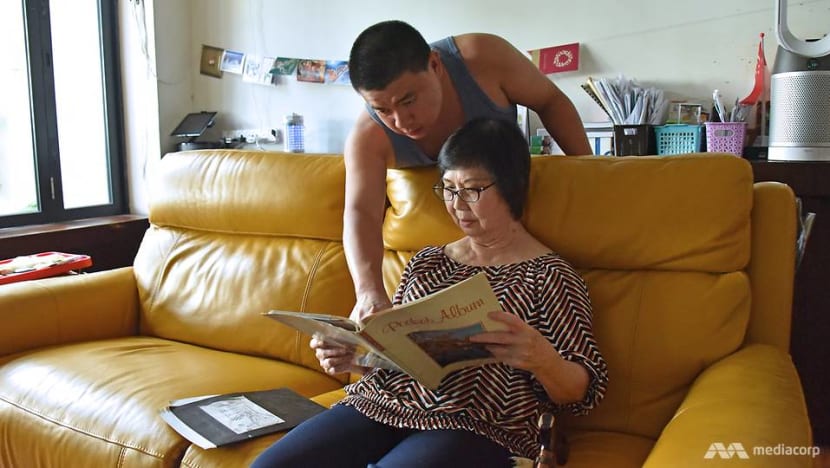
The family has not broached the topic since. But this has not stopped Mdm Ang and Mr Goh from worrying what would happen to their 40-year-old son after they are gone.
They are not alone. Parents of children with autism CNA spoke to shared their concerns over their children’s well-being after their death, while having to manage the present financial and emotional stress.
According to the Government's third Enabling Masterplan released in 2016, one in 150 children here has autism.
The five-year masterplan is a blueprint that guides the development of initiatives in the disability sector.
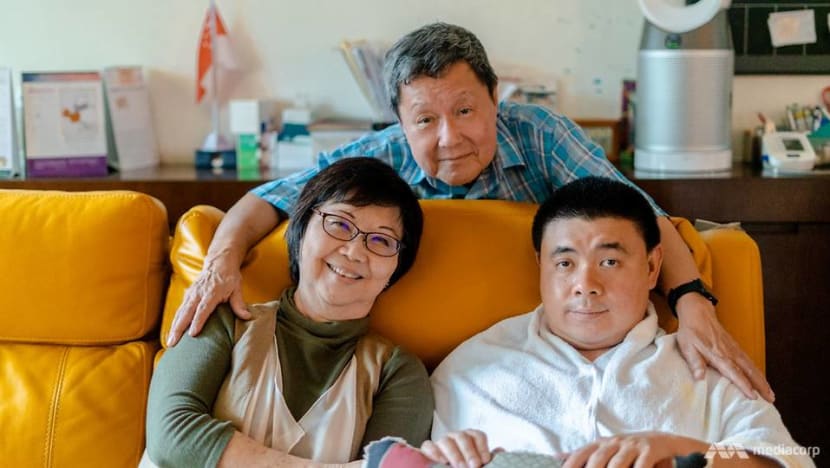
DELAYING RETIREMENT FOR THEIR CHILD’S FUTURE
Despite her age, Mdm Ang is still working. She's an adjunct primary school teacher earning about S$2,700 a month which is just enough to cover their monthly expenses, she said.
Once she is unable to work anymore, the family plans to sell their two-storey terrace house in Changi and move into a HDB flat, the Gohs said. Most of the sale proceeds, as well as their CPF money, will be left for Duane’s future needs, while the rest goes to their retirement. Their two older children have agreed to the arrangement, they said.
Mdm Ang said she does not think it is fair to force them to look after Duane, which can be "a lot of work".
Her daughter lives in the United States, and her elder son, whom Mdm Ang said is not close to Duane, works as an academic in Singapore.
A trust account with the Special Needs Trust Company (SNTC) will be set up for Duane, Mdm Ang said.
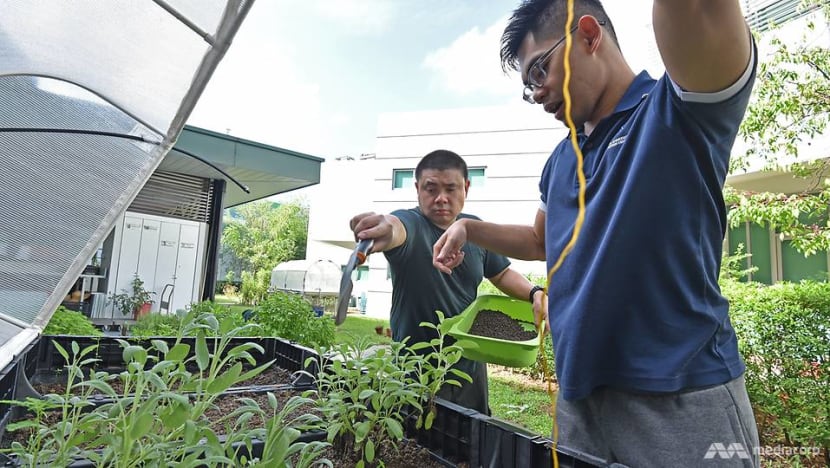
SNTC is a non-profit company set up in 2008 that provides trust services to people with special needs. Since its inception, more than 700 trust accounts have been set up, said Peggy Chan, SNTC’s senior manager of community engagement.
There is also a special needs savings scheme set up by the Ministry of Social and Family Development in partnership with the CPF Board, which allows parents to set aside CPF savings for the long term care of their children with special needs, added Ms Chan.
The charity did not say how much each caregiver is told to set aside as it depends on each beneficiary's needs. But two parents of sons with moderate-severe autism in their 20s told CNA that based on consultations with SNTC and their own calculations, they will have to put aside at least a million dollars for their child.
A study in the medical journal JAMA Pediatrics published in 2014 found that in the US, the lifetime cost of supporting a person with autism is US$1.4 million. For those with intellectual disabilities as well, the amount goes up to US$2.4 million.
READ: ‘They are all winners in our eyes’: How being judged in SYF alongside mainstream schools helped Pathlight students build confidence
WHAT IS AUTISM
Autism, or autism spectrum disorder (ASD), is a lifelong developmental condition that affects how a person relates to others and how they experience the world around them, said Patricia Cheng, the vice-principal of Eden School, which prepares students with autism for their lives as adults.
The disorder occurs specifically when the person has difficulty with social communication and interactions, and persistently displays repetitive patterns of behaviour, Mrs Cheng, who is also an autism consultant with the Autism Resource Centre, explained.
This is unlike intellectual disabilities, in which the individual has limitations in intelligence and adaptive functioning - their communication, social, motor and daily living skills.
ASD can co-exist with intellectual disabilities, she added.
Those with ASD can also display under or over reaction to one or more of the five senses: sight, touch, taste, smell, or hearing.

Duane could not speak properly until he was in his 20s, when he developed echolalia - a trait many people with autism have - said Mdm Ang. He repeats what others say - phrases like “everybody, please be quiet” from school, and “it’s okay, Chin” from his dad.
But aside from his speech patterns and meltdowns, Duane’s abilities has improved markedly since attending various autism programmes, she said. His growing independence has lightened their need to constantly watch over him.
He’s able to respond to questions, do his chores, and travel alone to St Andrew’s Autism Centre for day activities. Between 2013 and 2015 he even worked at a Burger King outlet but customers who were not aware of his condition complained that he was frightening them. Duane's parents made a decision then to ask him to quit.
In Jorah Mahmud’s case, the single mother of two could only catch a break six months ago, when her 19-year-old son Ansari was admitted into the Institute of Mental Health (IMH). His latest violent outburst, hitting and biting his sister and his mum one morning in June, had finally overwhelmed her.

Handling a son with autism meant non-stop work for Mdm Jorah. She would start off her mornings as a bus attendant for Rainbow Centre, before heading to Queenstown Primary School for her second job as a canteen stall helper. At 7pm, she reaches home, cooks dinner, does the chores, all while looking out for her son’s aggressive tendencies.
There are times when she blames herself for sending him to IMH, Mdm Jorah said. He had graduated from Rainbow Centre last year, only to end up in a hospital.
“But I have to tell myself: That is not the end of my son,” the 54-year-old said.
She hopes that his stay at IMH will mellow his behaviour. At home, he would frequently mess the flat up, shake the entrance gate vigorously, and shout. Neighbours have complained and called the police before, Mdm Jorah said.
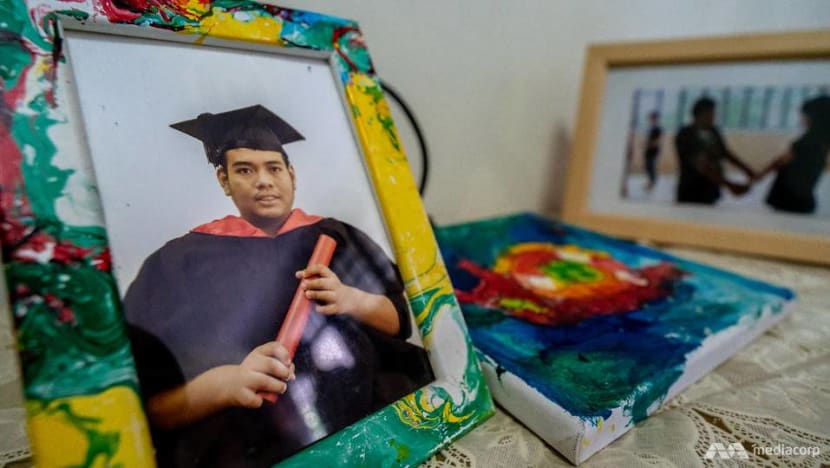
Her age also means she can no longer tend to her son as she used to. “I can’t catch up with him like last time. My stamina is low. I have to look after myself too.”
After her son was admitted to IMH, Mdm Jorah started to attend caregiver training organised by the non-profit Caregivers Alliance Limited. Being able to share her experience and hear from others has been helpful, she said.
Before joining the workshops, she had been feeling depressed from the trauma of her divorce and handling both Ansari and her daughter, she said.
NOT INCLUSIVE ENOUGH
Beyond their present anxieties and challenges, parents of these special children face the looming existential question: What happens when we die?
Practical support is available. People with disabilities can apply to live in community group homes, or adult disability homes and hostels. This year, St Andrew’s Autism Centre (SAAC) opened a home specifically for people with autism with a capacity for up to 200 residents.
Financial assistance is also offered to families who cannot afford to leave their children at the home in the long-run, said SAAC’s chief executive Dennis Ang.

The Gohs intend to place Duane there, although Mdm Ang has apprehension over the home possibly placing restrictions on Duane’s movements, since he enjoys going out. When asked about the concern Mr Ang said no constraints will be imposed on residents if they are independent enough.
After all, the goal is for them to find employment, he added.
Mdm Ang also harbours hope of Duane working again, though his failed stint at the fast-food joint left them acknowledging that their son still cannot fully assimilate with the public.
Perhaps what is necessary is not another facility or programme, autism experts said, but societal acceptance of people with invisible disabilities such as autism.
“Caregiver burnout is merely a symptom of a larger problem,” said Dr Justin Lee, a senior research fellow at the Institute of Policy Studies, “that we are not an inclusive society where our communities look out for one another".
He cited the 2016 Lien Foundation Inclusive Attitudes Survey to highlight the stigma experienced by children with special needs.
Among its findings were that 64 per cent of Singaporeans are willing to share public spaces with special needs children, but are not willing to interact with them. Children with special needs did not form a part of the social circles of over a third of Singaporeans, and only one in 10 Singaporeans were sure about how to interact with them.
Parents often have to ask themselves questions like “Do you take him out to a public place?”, “What if he voices out and engages in activities to regulate himself?”, said Mr Ang.
“The immediate statement they sometimes get from the public is, ‘how come your child is behaving like this? Haven't your brought up your child correctly?’”
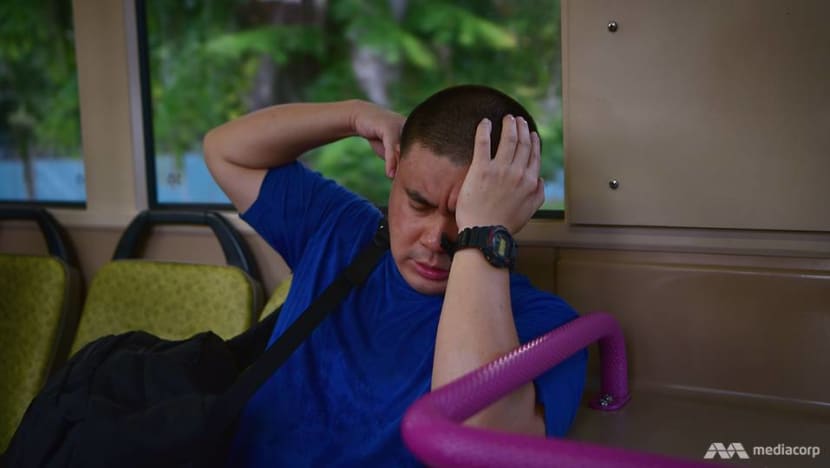
Discrimination goes beyond shaming these parents in public, the observers said. Their children need to be offered jobs, without any biases.
“Even helpful behaviour that unwittingly demeans people with disability is a source of stress and anxiety,” said Dr Lee. Tokenistic behaviour among employers who dumb down work just to give the person with disability something to do is one.
Instead, every person, from shopkeepers to the local doctor, should learn to interact with people with special needs, he said. Neighbours could offer to babysit or set up playdates, a form of support “sometimes (can) be better than formal respite care services”.
READ: Commentary: Three stories from caregivers show we still undervalue caregiving
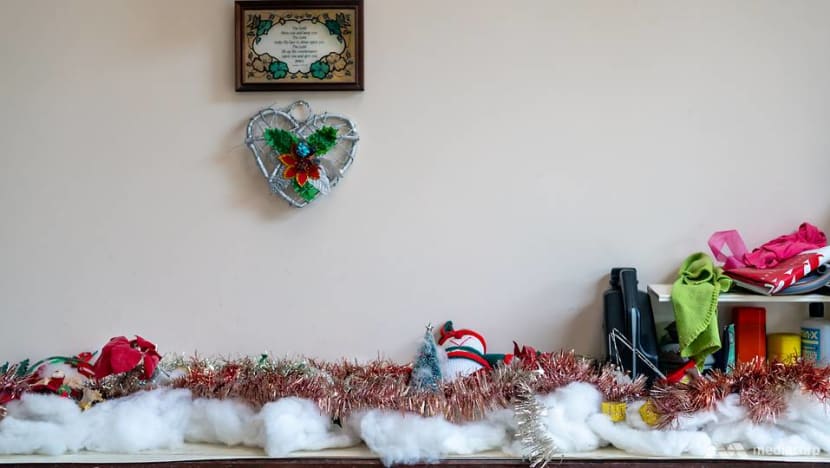
"SON PLUS GRANDSON ALL ROLLED INTO ONE"
Raising a child with special needs has brought its fair share of heartaches - name-calling, near-altercations in public, self-doubt - but the Gohs said they will not trade the journey for anything else.
It is as if they have a little child around all the time, Mr Goh said. He often pats Duane on his head, and hugs him whenever he is agitated.
“I can’t imagine doing this with my 50-year-old son,” he said, perked up by the thought.
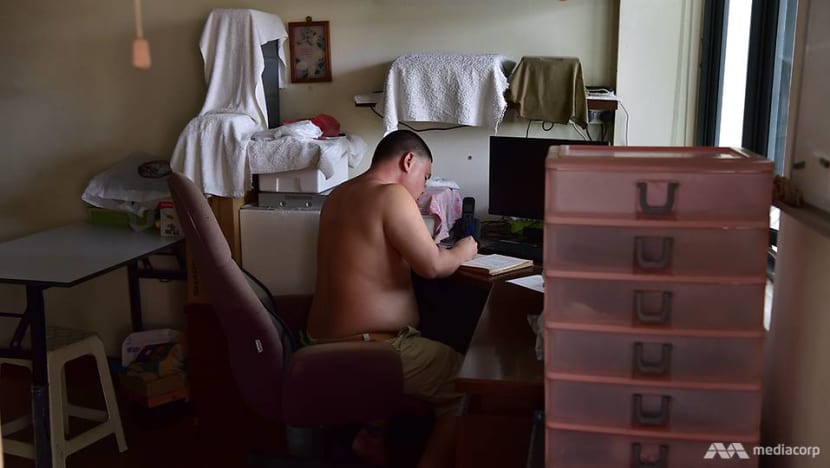
Mdm Ang and Mr Goh visit a mall after dinner almost every night because Duane likes to go out - and because he insists on “family togetherness”.
It is because of Duane the Gohs know almost every neighbour on their street, past and present, as he goes up to introduce himself to anyone new. Come the holiday season, their mailbox is stuffed with cards reciprocating the gesture, courtesy of Duane and his Christmas greetings.
“He's not a problem,” said Mr Goh. “And he will never be a problem to me."
"Raising this boy has been a pleasure."














